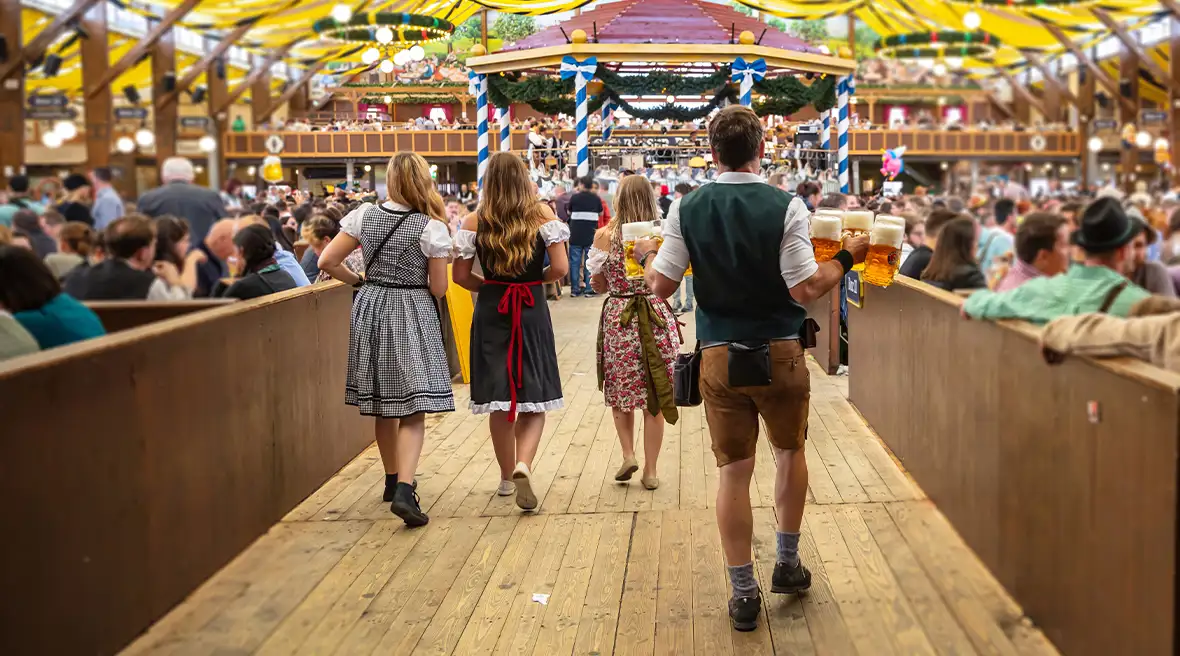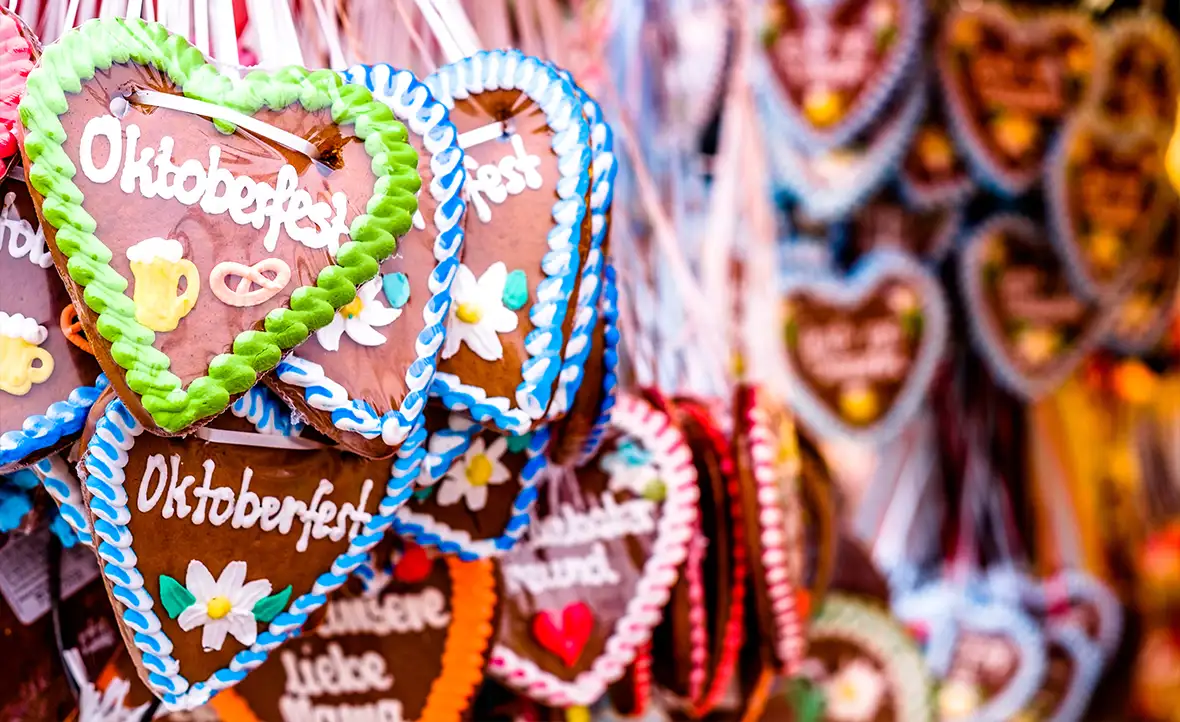Oktoberfest in Munich

Held at the largest fairground in Munich, Theresienwiese, Oktoberfest is not just a beer festival – it’s the world’s largest folk festival, celebrating Bavarian food, drink, music, traditional dress and culture.
Travelling with LeShuttle means you can drive straight from the UK, giving you the freedom to pack more, travel at your own pace, and make the most of stopovers in France, Belgium or Luxembourg on your way to Munich.
Where is Oktoberfest in Munich?
Oktoberfest, sometimes known as the Munich beer festival, is held in Theresienwiese, a vast fairground in the Ludwigsvorstadt district of Munich. While the grounds host events year-round, Oktoberfest is by far the biggest, attracting millions of visitors every autumn. Among the main landmarks at Theresienwiese are the colossal bronze Bavaria statue and the Ruhmeshalle ‘hall of fame’, which displays busts of Bavaria’s most notable figures. In recent years, the site has also introduced more family-friendly areas such as the Oide Wiesn (Old Oktoberfest), offering traditional rides and a calmer atmosphere alongside the main festival.
Visiting Oktoberfest 2026: dates, times and ticket information
Oktoberfest has become a big attraction in the UK, but every festival in your local town or city has been inspired by the original, and best Oktoberfest – the one held annually in Munich. But when is it, and how do you get there?
Next year’s Oktoberfest will be held between Saturday 19th September and Sunday 4th October 2026. Its longstanding traditional home is the city of Munich, Germany, the capital of the state Bavaria. Locals often refer to Oktoberfest as the Wiesn, a colloquial term for fairgrounds.
If you have never been before, driving to Oktoberfest from the UK is a great way of getting to Munich. The crossing from Folkestone to Calais only takes 35 minutes, and then it’s time for an exciting German road trip!
What happens at Oktoberfest?
The Opening Ceremony ("O'zapft is!") takes place on the first Saturday and includes a parade featuring the Oktoberfest landlords and decorated brewery wagons takes place before midday. This is followed by the Mayor’s arrival at the Schottenhamel tent. At 12 pm the Lord Mayor of Munich taps the first wooden keg of the season and declares "O'zapft is!" (It's tapped!), signaling that all beer tents can begin serving Oktoberfest beer!
Over the following days of Oktoberfest, there are numerous important historical events. Some of the highlights include:
The Wiesn church service, held at Marstall festival tent at 9.30am on Thursday 24th September, is a traditional ecumenical service where prayers are said for a peaceful Wiesn. Entry is free.
The Wiesn landlords’ concert, will be held at Theresienwiese at 11am on Sunday 27th September, traditionally at the foot of the Bavaria statue. This free concert gathers together all the big brass bands featuring in Oktoberfest for a rousing concert of songs and marches.
A traditional gun salute will close the Oktoberfest on Sunday 4th October at 12 noon. Around 60 shooters in traditional dress gather on the steps below the Bavaria statue and salute to a traditional brass band. Every shot emits white smoke as black powder, rather than bullets, is fired.
 The Marienplatz, the central square in Munich
The Marienplatz, the central square in Munich
The history of Oktoberfest, beer festival in Munich
The first Oktoberfest was held in 1810. Legend states is was originally put in place to celebrate a wedding between two royals. For five long days, prominent figures in society were invited to drink and dine in splendour in front of the Sendlinger Tor, one of the gates leading to Munich, surrounded by parades and live music. There was also a horse race around the meadow just outside the centre of Munich.
The whole event was such a success, the organisers decided to keep having it year after year and, when possible, it’s been happening ever since. The festival has now been held over 180 times!
Oktoberfest parades
Visiting Oktoberfest is for all the family, and the festival parades show just how great Oktoberfest can be for people of all ages, even those not interested in the beer. Oktoberfest officially begins with a traditional colourful parade through the streets. The following weeks see other parades take place, all to mark the celebration in traditional style. If you’re there for the start of the festival, the opening parade is a great way to get stuck in before the festivities officially begin.
 A large swing ride, also known as a chair swing or wave swinger, one of the many types of attractions at Oktoberfest!
A large swing ride, also known as a chair swing or wave swinger, one of the many types of attractions at Oktoberfest!
The opening parade
All the patrons take part in the opening parade, starting their march at 11 o’clock in the morning. There are floats and carriages carrying people in costume to the site of the beer tents, where at 12 noon the Mayor of Munich will tap the first beer barrel, so that celebrations may commence!
A fantastic display, this grand parade leads the crowds to the Oktoberfest tent. Horse-drawn carriages represent each of the breweries in Munich, and landlords from the participating local pubs are dressed in traditional outfits. Waitresses from each pub dance on intricately decorated floats, and live music is played by the beer-tent bands.
Costume and Rifleman’s parade
On the first Sunday of the festival there’s a display by the Costume and Rifleman's Procession, which shows a range of different costumes from different historical troops.
You can expect to see marching bands, horses, cows, goats and decorated brewery floats, featuring traditional tools, harvest produce and flower arrangements. Trumpets blare in the background as flag throwers perform, and it makes for a wonderful display of traditional Bavarian culture. On the same day, you’ll be able to see a huge open-air concert featuring almost 400 musicians.
Where is Oktoberfest in Munich?
The Oktoberfest is held in Theresienwiese, a fairground in the Ludwigsvorstadt district of Munich. The fairground hosts many festivals and events throughout the year, but the biggest by far is Oktoberfest. Among the main attractions in Theresienwiese is the huge bronze Bavaria statue and the Ruhmeshalle, the ‘hall of fame’ where busts of famous historic Bavarians are displayed. The best way of getting to Oktoberfest once you are in Munich is on the U-Bahn train network. The closest U-Bahn stations for Theresienwiese are Goetheplatz and Poccistraße.
Food and drink
When you visit Oktoberfest in Munich, the beer flows freely. All the beer served at Oktoberfest comes from local breweries in Munich, including Augustiner, Paulaner and Spaten. Servings of beer tend to come in large one-litre glasses, also known as ein Maß, which are carried by barmaids dressed in traditional Dirndl dresses. You can also order a lighter version mixed with lemonade, called a Radler.
If beer isn’t your thing, there are also tents serving local regional wines, and even a café tent with coffee and soft drinks, as well as cakes and pastries.

Oktoberfest beer tents
There are a lot of different beer tents set up for Oktoberfest. Some with outdoor seating, others sponsored by a specific brewery and featuring special types of beer. The Hacker Tent marks the final night with everyone waving sparklers to 'Sierra Madre', a traditional song. The Schottenhamel Tent has been running since 1867 and this is where the mayor taps the first barrel of Oktoberfest.
Be sure to check for seating reservations for a specific tent that catches your eye, as some have limited seating.
Oktoberfest food
Roast ham hock and chicken are common dishes served in almost every tent, and you must try the wurst (sausages) served with sauerkraut, mustard or bacon. Other popular dishes and foods include kasespatzle (cheese noodles), yummy salted soft pretzels and potato pancakes.
Be sure to sample the delicious gingerbread (not just for the kids!). It comes in countless sizes and variations with declarations of love or typical Bavarian Grant slogans written in icing. The hearts are a traditional gift to bring home as a memory of Oktoberfest.
Every German city has its own Oktoberfest traditions and local specialities. Read our city guides to Düsseldorf and Leipzig to find out more.

Plenty for families at Oktoberfest
Oktoberfest is not just geared towards adults, despite predominantly being about the beer. There are loads of fun things to do as a family. Most tents have live Bavarian music and dancing, but the star of the show, as far as your kids will be concerned, is definitely the fun fair.
There are plenty of different rides, including flying swings, merry-go-rounds, shooting galleries and loop-the-loop rollercoasters. And if that’s not enough to get your kids excited, why not indulge their sweet tooth at the candyfloss stands – but maybe save that one until after the loop-the-loop!
To make the festival even more welcoming for families, Oktoberfest has introduced special ‘Family Days’ on Tuesdays, when rides and food are offered at reduced prices. The calmer Oide Wiesn (Old Oktoberfest) area is also a great option, with vintage rides, traditional folk music and plenty of space away from the busiest tents. Together, these changes mean that families can enjoy the atmosphere of Oktoberfest in a safe, relaxed and affordable way.
Get to Oktoberfest – Driving to Munich from Calais
The drive to Munich from our Calais terminal will take you roughly nine hours, so you may want to schedule in a couple of rest stops along the way. The quickest route is to follow the European Route E40, taking you through Belgium and over the German border as far as Cologne. From here, you can pick up the Bundesautobahn 3, which will take you down to Nuremberg where you can join the Bundesautobahn 9 all the way to Munich.
Before you know it, you’ll find yourself in the midst of all the fun of Oktoberfest – enjoy!
Munich Oktoberfest: where to stay
If you’re visiting Munich for Oktoberfest, it’s best to stay as close to Theresienwiese as possible so you can walk to and from the festival grounds. Popular areas include Ludwigsvorstadt and Isarvorstadt, both within easy reach of the tents. For a wider choice of hotels and better rates, consider staying near Munich’s Hauptbahnhof (central station), which has excellent U-Bahn links to the festival. Budget travellers might look at hostels or campsites on the city’s edge, while families often prefer apartments or hotels.
Visit Oktoberfest with LeShuttle
Getting to the continent is easy with LeShuttle. It takes just 35 minutes, and with services operating 24 hours a day, 365 days a year, you’ll have no problem finding a time to travel that suits you.
FAQs
We’ve answered your frequently asked questions to help you plan your trip to Oktoberfest.
Can children attend Oktoberfest?
Yes, children are welcome at Oktoberfest. Families often visit during the day, and there are special “Family Days” with discounted rides. Children under 6 must leave tents by 8 pm.
How to get tickets for Oktoberfest tents?
Entry to Oktoberfest is free, but tables inside beer tents require reservations. These can be booked directly through each tent’s website, often months in advance. A limited number of seats are kept unreserved for walk-ins.
What should I wear to Oktoberfest?
Traditional Bavarian dress is popular but not a requirement. Men often wear lederhosen and women wear dirndls, while comfortable casual clothes are also perfectly acceptable. Sturdy shoes are recommended for walking and dancing.
Join Club LeShuttle
